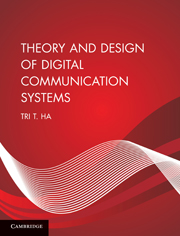Book contents
- Frontmatter
- Contents
- Preface
- Acknowledgements
- List of symbols
- List of abbreviations
- 1 Introduction
- 2 Deterministic signal analysis
- 3 Random signal analysis
- 4 Information theory and channel coding
- 5 Communication link analysis
- 6 Modulation
- 7 Demodulation
- 8 Spread spectrum
- 9 Intersymbol interference and equalization
- 10 Fading channels
- Index
- References
3 - Random signal analysis
Published online by Cambridge University Press: 05 June 2012
- Frontmatter
- Contents
- Preface
- Acknowledgements
- List of symbols
- List of abbreviations
- 1 Introduction
- 2 Deterministic signal analysis
- 3 Random signal analysis
- 4 Information theory and channel coding
- 5 Communication link analysis
- 6 Modulation
- 7 Demodulation
- 8 Spread spectrum
- 9 Intersymbol interference and equalization
- 10 Fading channels
- Index
- References
Summary
Introduction
So far we have studied deterministic signals that are used to carry information. As far as the receiver is concerned, the stream of transmitted digital waveforms that carries information symbols is a random signal because the information is random. Also, as the transmitted signal travels through the channel, it is modified by noise, which is a random signal and is often referred to as a random process. Therefore, the receiver receives the transmitted signal plus noise. Such a channel is called an additive noise channel. Furthermore, wireless signals such as cellular signals and wireless LAN and MAN signals always travel through a time-varying multipath fading channel, which causes the signal envelopes to vary randomly. The time-varying phenomenon arises from Doppler shift, which is the result of the motion of the transmitters and/or receivers. The multipath fading is the result of the destructive interference of signal rays that travel via randomly delayed and attenuated paths. Therefore, the received signal itself becomes a random signal. To analyze random signals in communication receivers we need to know their statistics. In this section we explore some tools necessary for such a task. We divide the discussion into reviews of probability theory and random variables, and study of random processes and their applicability to communication theory.
Information
- Type
- Chapter
- Information
- Theory and Design of Digital Communication Systems , pp. 78 - 121Publisher: Cambridge University PressPrint publication year: 2010
